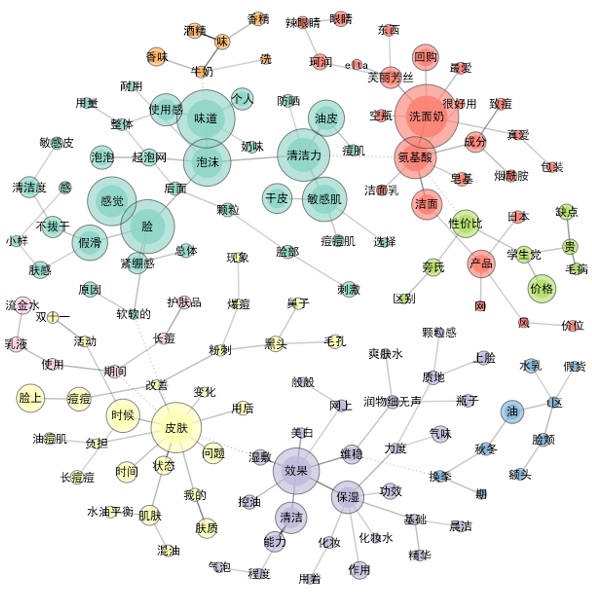 PDF(3192 KB)
PDF(3192 KB)


 PDF(3192 KB)
PDF(3192 KB)
 PDF(3192 KB)
PDF(3192 KB)
基于共现网络与情感分析的多平台消费者评论主题比较研究
A Comparative Study of Multi-Platform Consumer Review Topics Based on Co-Occurrence Network and Sentiment Analysis
[目的/意义]旨在以实证分析研究虚拟生活社区、社交平台、购物平台的用户对于同一款产品的评价内容主题倾向异同。[方法/过程]选取“你今天真好看”App、微博、京东三个平台为实验对象,共采集54 071条同一护肤品的用户评论文本,采用LDA主题生成模型、共现网络,基于机器学习的情感分析方法对用户评论文本进行多平台比较分析。[结果/结论]研究发现三个平台共八大评论主题的主题特征词、共现网络、主题情感上各有异同,且内容倾向符合各平台特点。
[Purpose/Significance] The purpose of this article is to study the similarities and differences in the evaluation content of users of virtual life communities, social platforms and shopping platforms for the same product. [Method/Process] By selecting the three platforms of You Really Beautiful App, Weibo, and JD.com as the experimental objects, 54 071 user comment texts related to facial cleanser as basic skin care products were collected, using LDA topic generation model, co-occurrence network and machine learning-based sentiment analysis method, a multi-platform comparative analysis of user comment texts is carried out. [Result/Conclusion] The study found that there are similarities and differences in the topic feature words, co-occurrence network and topic sentiment of eight comment topics on the three platforms, and the content tendencies conform to the characteristics of each platform.

多平台比较 / 文本主题聚类 / 共现网络分析 / 情感分析
multi-platform comparison / text topic clustering / co-occurrence network analysis / emotion analysis
| [1] |
王琳,梁孟华.基于知识发布的网络社区用户行为规律研究——以Keep健康社区为例[J].情报探索,2022(1):1-9.
|
| [2] |
杨瑞仙,张广轶.学术虚拟社区知识交流过程与机理研究[J].现代情报,2020,40(10):52-61.
|
| [3] |
陈秀秀.基于微博评论的虚拟社区互动性对消费者品牌态度的影响及机制研究[D].江门:五邑大学,2019.
|
| [4] |
谭春辉,李玥澎.基于用户评论与Kano模型的虚拟学术社区优化策略研究[J].情报理论与实践,2021,44(11):108-115.
|
| [5] |
周阳,谭春辉,朱宸良,等.基于扎根理论的虚拟学术社区用户参与行为研究——以小木虫为例[J].情报科学,2022,40(1):176-183.
|
| [6] |
CHEN H, LIU F, WEN Y, et al. Compilation and application of the scale of sustainable knowledge sharing willingness in virtual academic community during the times of the coronavirus pandemic (COVID-19)[J]. Front psychol,2021(12):627833.
|
| [7] |
TABISH M, BASHIR M A, ALAM M M, et al. The role of virtual community participation and engagement in building brand trust: evidence from Pakistan business schools[J]. The journal of Asian finance, economics and business,2022,9(3):399-409.
|
| [8] |
CARA P, BODKIN D. CHARLES. Online retail store community engagement and its impact on purchase intentions in the context of online reviews[J]. International journal of online marketing, 2022,12(1):1-15.
|
| [9] |
CHAKRABORTY U. The impact of source credible online reviews on purchase intention[J]. Journal of research in interactive marketing,2019,13(2):401-414.
|
| [10] |
屈慧君.互动活力与信任的链式中介效应——微博虚拟品牌社区用户参与动机对购买意愿的影响[J].郑州大学学报(哲学社会科学版),2019,52(2):113-117.
|
| [11] |
郭恒睿,王中卿,朱巧明,等.基于半监督学习的中文社交文本事件聚类方法[J].中文信息学报,2022,36(2):152-159.
|
| [12] |
谢红.基于词频比的改进Jaccard系数文本相似度计算[J].内江科技,2021,42(8):27-28.
|
| [13] |
王春柳,杨永辉,邓霏,等.文本相似度计算方法研究综述[J].情报科学,2019,37(3):158-168.
|
| [14] |
邱先标,陈笑蓉.一种基于特征加权的文本相似度计算算法[J].贵州大学学报(自然科学版),2018,35(1):63-68.
|
| [15] |
BLEI D M, NG A Y, JORDAN M I. Latent Dirichlet Allocation[J]. Journal of machine learning research,2003,3(4/5):993-1022.
|
| [16] |
HAJJEM M, LATIRI C. Combining IR and LDA topic modeling for filtering microblogs[J]. Procedia computer science,2017(112):761-770.
|
| [17] |
李璐萍,赵小兵.基于主题模型的主题发现方法研究综述[J].中央民族大学学报(自然科学版),2021,30(2):59-66.
|
| [18] |
何琳,马晓雯,喻雪寒,等.典籍事件触发动词识别研究:基于《左传》的文本实验[J].图书情报工作,2022,66(5):133-141.
|
| [19] |
王慧,孙国道,丁伟杰,等.司法判决文书数据中演化模式的挖掘和可视分析[J].计算机辅助设计与图形学学报,2022,34(3):470-481.
|
| [20] |
张雷,谭慧雯,张璇,等.基于LDA模型的高校师德舆情演化及路径传导研究[J].情报科学,2022,40(3):144-151.
|
| [21] |
崔宁,赵宗良,吴瑞雪.基于LDA主题模型和偏序集的在线商品评论研究[J].情报探索,2021(12):71-76..
|
| [22] |
黄仿元.利用机器学习算法实现对医院评价的情感分析[J].信息技术与信息化,2021(2):37-39.
|
| [23] |
尚永敏,赵榆琴.基于机器学习的在线评论情感分析与实现[J].大理大学学报,2021,6(12):80-86.
|
| [24] |
艾媒数据中心.2022年中国洗面奶消费者行为洞察[EB/OL].[2022-04-05]. https://data.iimedia.cn/31026926/31026945/44290232.
|
| [25] |
21经济网.微博回港二次上市:75%用户为90后 社交“元老”开启第二春?[EB/OL].[2022-04-05].http://www.21jingji.com/article/20211119/herald/55ae24eb120e9a397954803e832d4ada.html.
|
| [26] |
CSDN.折肘法+困惑度确定LDA主题模型的主题数[EB/OL].[2022-04-05].https://blog.csdn.net/weixin_43343486/article/details/109255165.
|
| [27] |
池毛毛,潘美钰,王伟军.共享住宿与酒店用户评论文本的跨平台比较研究:基于LDA的主题社会网络和情感分析[J].图书情报工作,2021,65(2):107-116.
|
/
| 〈 |
|
〉 |